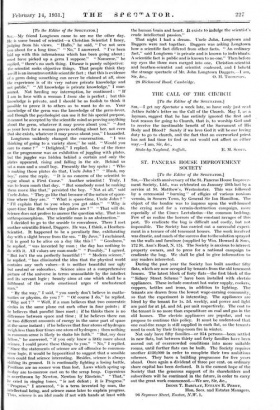[To the Editor of the SPECTATOR.] Sia,—My friend Longtown came
to see me the other day. He is some brand of scientist—a Christian Scientist I fancy, judging from his views. " Hullo," he said, " I've not seen you about for a long time." " No," I answered. " I've been laid up with this infernalenza which has been going about ; must have picked up a germ I suppose." " Nonsense," he replied, " there's no such thing. DiseaSe is purely subjective; the scientist seeks objective things. That people think they are ill is an incontrovertible scientific fact ; that this is evidence of a germ doing something can never be claimed at all, since the experience is of its very nature private knowledge and not public." " All knowledge is private knowledge," I mur- mured. Not heeding my interruption, he continued : " If I am in love with a woman I know she is perfect ; but this knowledge is private, and I should be as foolish to think it possible to prove it to others as to want to do so. Your knowledge of the germ was the knowledge of the germ-lover, and though the psychologist can use it for his special purpose, it cannot be accepted by the scientific mind as proving anything about the germ, whatever it may prove about you." " Just as your love for a woman proves nothing about her, not even that she exists, whatever it may prove about you," I hazarded.
Longtown suddenly changed the conversation. " I was thinking of going to a -variety show," he said. " Would you care to come ? " " Delighted," I replied. One of the items on the programme was an exhibition of juggling with plates, but the juggler was hidden behind a curtain and only the plates appeared, rising and falling in the air. Behind us sat a man and a small boy. Presently the boy spoke i " Who is making those plates do that, Uncle John " " Hush, my boy," came the reply. " It is no concern of the scientist to argue about a First Cause." Another scientist ! Truly, I was to learn much that day. " But somebody must be making them move like that," persisted the boy. " Not at all," said Uncle John. " They go like that because of the nature of space- time where they are." " What is space-time, Uncle John ? " I'll explain that to you when you get older." " Why is space-time like that where the plates are ? " " That will do. Science does not profess to answer the question why. That is an anthropomorphism. The scientific man is an abstraction."
I decided to go to the seaside to convalesce. There I met another scientific friend, Daggers. He was, I think, a Heathen- Scientist. It happened to be a peculiarly fine, exhilarating day with a slight breeze from the sea. " By Jove," I exclaimed, " it is good to be alive on a day like this ! " " Goodness," he replied, " was invented by man ; the day has nothing to do with it. All values are man-made " " Possibly," I agreed. " But isn't the sea perfectly beautiful ! " " Modern science," he replied, " has eliminated the idea that the physical world contains any such values—it is neither beautiful nor ugly but neutral or colourless. Science aims at a comprehensive picture of the universe in terms unassailable by the intellect and its servant logic ; beauty aims at one which shall be a fulfilment of the crude emotional urges of unchastened man."
" By the way," I said, " you surely don't believe in mathe- matics or physics, do you ? " " Of course I do," he replied. " Why not ? " " Well, if a man believes that two concentric circles in the same plane cut each other in four points ; if he believes that parallel lines meet ; if he thinks there is no difference between space and time ; if he believes there can be two different amounts of energy in the same part of space at the same instant ; if he believes that four atoms of hydrogen weigh less than four times one atom of hydrogen ; then nothing in common sense is likely to shake his faith." "But, my dear fellow," he answered, " if you only knew a little more about science, I could prove these things to you." " No," I replied. " Since the statements of science are all offensive to common- sense logic, it would be hypocritical to suggest that a sensible man could find science interesting. Besides, science is always shifting its ground. It is continually fighting a losing battle. Positions are no sooner won than lost. Laws which spring up to-day are to-morrow cast on to the scrap heap. Copernicus is overthrown by Newton, Newton by Einstein." " That," he cried in ringing tones, " is not defeat ; it is Progress."
Progress," I answered, " is a term invented by man, the intellectual being, and science came later to explain progress. Thus, science is an idol made if not with hands at least with
the human brain and heart. U exists to indulge the scientist's crude intellectual passion."
That night I had a dream. Uncle John, Longtown and Daggers were met together. Daggers was asking Longtown how a scientific fact differed from other. facts. " An• ordinary fact," said Longtown " is private and is known to individuals.. A scientific fact is public and is known to no one." Then before my eyes the three men merged into one. Christian-scientist and heathen-scientist and scientist coalesced, and I beheld the strange spectacle of Mr. John Longtown Daggers.—I am,
Sir, &c., 0. H. THOMPSON. 28 Richmond. Road, Cambridge.















































 Previous page
Previous page